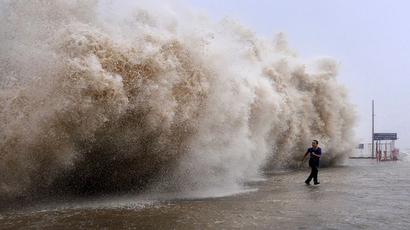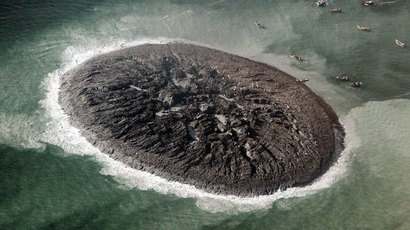India cyclone Phailin leaves trail of devastation, 23 dead (VIDEO)
Cyclone Phailin, India’s strongest in 14 years, has left towns and villages flooded and tens of thousands of homes destroyed. The country managed to avoid a high loss of life, however, by moving about a million people into shelters.
An estimated twenty three people died as a result of the cyclone,
which hit India’s eastern coast on Saturday.
“Damage to property is extensive,” said Amitabh Thakur, the top police officer in the eastern coastal district of Odisha, which was the worst hit by the cyclone. “But few lives have been lost.”
Relief and rescue operations are now underway in the states of Orissa and Andhra Pradesh, Marri Shashidhar Reddy, vice chairman of the National Disaster Management Authority, told reporters.
He said 23 people in total had been killed by the storm. Most died from falling trees and one woman was crushed when the walls of her mud hut fell in.
"We have been able to ... (keep) the death toll to a bare minimum," he said. Mass evacuations ahead of the cyclone prevented the widespread deaths that many in India had feared.
Speaking at a press conference in New Delhi, Reddy said that 685
kilometers of road had been cleared of trees and other debris.
A cyclone of the same strength, which hit the same area in 1999,
led to the death of about 10,000 people. This time a million
people were moved into shelters, as part of one of India's
largest evacuations. As the storm was approaching, the
Indian military prepared for relief operations.
"We saved lives by putting them in shelters in time," Reuters reported Odisha's special relief commissioner, J.K. Mohapatra, as saying.
The authorities cancelled holidays of some civil servants during
the Hindu Dussehra festival, deployed disaster response teams as
well as helicopters and boats for rescue operations and relief
efforts.
A Panama-registered cargo ship, the MV Bingo, carrying 8,000 tons
of iron ore, sank Saturday as a result of the storm. It was
not immediately clear if its crew, 17 Chinese citizens and one
Indonesian, managed to reach the shore in the lifeboat in which
they left the sinking vessel. Radio contact with the crew was
last established early Sunday morning.
In the Odisha district, which relies heavily on agriculture for its economy, more than 500,000 hectares of crops, worth an estimated $400 million, were destroyed by the cyclone.
Defense and para-military personnel were deployed to carry out relief work including restructuring infrastructure that has been badly affected by the storm.
"Property to the tune of several crores has been damaged...rehabilitation will now be done," Naveen Patniak, Odisha's chief minister told the Times of India.
Although casualties were much lower than they might have been had it not been for the successful evacuation the cyclone left a trail of destruction along the coast. Along the main highway through Ganjam district in the Odisha province electricity poles were dislodged an electricity tower lay in a mangled heap and power was cut off in most of the state.
The Indian Red Cross estimates that over 250,000 mud and thatch homes owned by poor farming and fishing communities had been destroyed just in the Ganjam district.
“They cannot stay in the shelters for long as they are overcrowded and sanitation issues will crop up with the spread of diseases such as diarrhoea and dysentery, especially amongst young children," Mangla Mohanty, head of the Indian Red Cross in Odisha, said by phone to Reuters from Ganjam district.
















